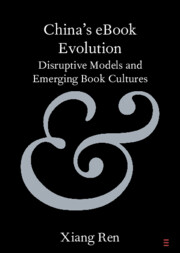Element contents
China's eBook Evolution
Published online by Cambridge University Press: 23 May 2024
Summary
- Type
- Element
- Information
- Online ISBN: 9781009464864Publisher: Cambridge University PressPrint publication: 13 June 2024
References
- 2
- Cited by

